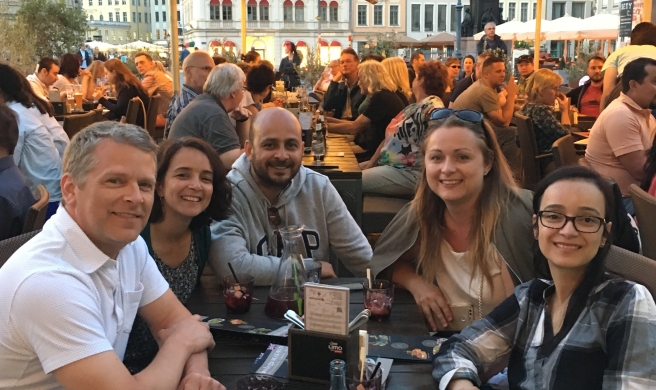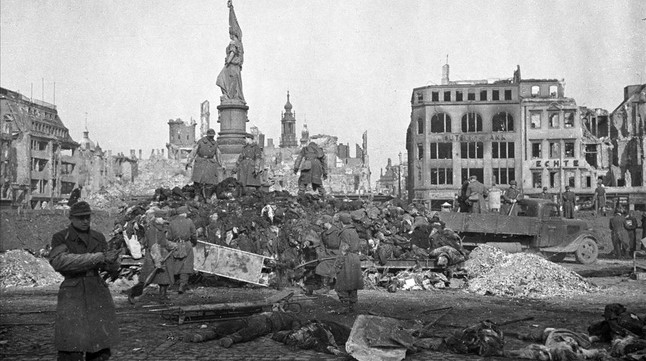When my Mom was born, this place was in ruins. When her mother started hearing “when’s the baby due?”, bodies were piled high on whatever flat surfaces could be found between mounds of rubble. Kurt Vonnegut, Jr. worked the area, assisting other prisoners-of-war in looting valuables from the corpses for their captors before the Nazi guards cremated their German countrymen on-the-spot with flamethrowers. Here.
The tapas were decent; some of them pretty good. I realized during the meal that I wasn’t even all that impressed with tapas when I was in Spain eating them, and that my desire to eat at this particular place—in Germany—was more about re-living my first experience in Europe than the anticipation of a memorable meal. They didn’t serve my favorites: pinchos morunos and tortilla de patata.
When my Mom was in first grade, this place was still in ruins. The photos prove it. The spectacular church across the way was not fully re-built until her granddaughter was speaking her first precocious sentences 60 years later.
The sangría here is sweeter than it is in Spain, and I like this stuff better.

I know the history, and though I just saw the pictures, I am nearly seduced by this classic European plaza. The church inspires the requisite awe, though mostly of the secular kind, these days. The setting holds one type of appeal for those who know what happened here, and another for those who believe that what they’re seeing is as ancient as it looks.
Spain was fascist when the bombs fell, and would remain so until I was in fourth grade. My country, which dropped the second wave of bombs here, had reasoned (reasonably) that support for the anti-fascists in Spain amounted to an endorsement of a communist post-war Spain, and let Spain fall to the man who let Hitler use one of his cities as target practice for bombers.
My Dad’s story is that he got the inside scoop that his draft number was about to be typed onto The Form, but that if he could join a National Guard unit that day he could avoid Vietnam and he and his friend got the last two spots and the continuation of our ugly family history of wartime service and lifetime dysfunction was averted—save the dysfunction he inherited from his liberator of France, whose dysfunction probably lives in me in ways others can see but I’m oblivious to.
I had hoped to speak some Spanish here this evening. I know that some Spaniards go to Germany and start out in the service industry, so maybe the waiters…. Or do I know what Spaniards of twenty years ago did, since that’s when I was in Spain? When they said “Germany”, they probably meant “West Germany”? In the ‘90s, this was still the un-glamorous “former East Germany”, and that church over there wasn’t done (again) yet.
My Spanish did me no good in my travels through Czech Republic. Nor did my high school French, my college Greek, or the Portuguese I’ve picked-up from my Brazilian wife and her—our—family. None of the Czech I picked up did me any good in Budapest. Most of the German I know comes from history courses: Anschluss, Blitzkrieg, Lebensraum, Luftwaffe. I want to use my language skills, but I don’t want the Nazis to come back to make my German vocabulary relevant.
I learned here that the German word for “old” is alt. The most modern-looking place in the city is called the Altmarkt—the old market. How many people, for how many years, could say Altmarkt only through tears? Do their grandchildren ever joke about what a stupid name this is for the area? Do they understand why the absurdity is so chilling?
Our waiter does not speak Spanish. I do not speak Vietnamese. He probably speaks English, but he generally doesn’t speak, and we don’t press him to, as we’ve grown used to pointing and gesturing our way through meals. A second young Vietnamese man delivered our food, also wordlessly.
Their grandfathers might have fought my Dad if not for that lucky typewriter incident that I assume was exaggerated but who cares because either way it was dumb luck that kept him out of Vietnam. Now they’re in Germany carrying pulpo a la gallega to Americans (and Brazilians, a Czech, and whoever’s filling all those other tables), indifferent to the ghosts that maybe they can’t sense because it wasn’t their fight. Or maybe their casual navigation among the spirits was born of a familial ease; my government spent the first nine years of my life firebombing their ancestors into whatever comes next. Could the spirits here remind them of home?
I didn’t feel the ghosts yesterday, but I feel them now, because I just saw the pictures.
Brazil is losing to Belgium on the Korean TV in front near the entrance to the deserted indoor portion of Bodega Madrid. My Brazilian brother-in-law is disgusted, but this is not a new feeling for him this World Cup season. The Brazilians have not won a World Cup since he moved to Czechia. His Czech wife won’t call it Czechia because that’s stupid. I’m sure my Dad still calls it Czechoslovakia and always will. He still occasionally calls black people “colored”, and always will.
My people helped the British to obliterate “the Florence of the Elbe”, and tens of thousands of civilian residents, though the war was all-but-won. But the people of Dresden don’t hate me. They’re still finding unexploded ordnance in Vietnam, but these waiters don’t hate me. Spaniards don’t hate me because my people stopped Hitler and enabled (and profited from) Franco. Though he inherited vocabulary from people who did, my Dad doesn’t hate black people. My brother-in-law doesn’t hate Belgians.

I had a nice dinner on the site of an atrocity of unfathomable proportions. The family time and the ambiance were special, but I wasn’t fully present because I couldn’t stop listening to the ghosts. They showed me that the most transcendent marvel in the plaza was not the restored church, but the arc of history.
Most of the shit we fight about will disappear faster than we realize. We will die and be replaced by the blissfully ignorant, who will be better off without our grudges. You might think the ghosts would resent the TripAdvisor-ization of their tragedy, but they told me they’re fine with it because there is peace.
Freedom and peace.
Please view The Photos, here, here, and here.